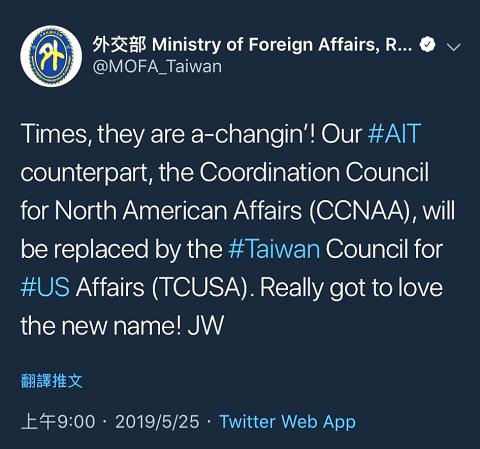The Coordination Council for North American Affairs has been renamed the Taiwan Council for US Affairs, President Tsai Ing-wen (蔡英文) said yesterday, hailing the move as a breakthrough in Taiwan-US relations.
The names of Taiwan and the US appear alongside each other in an agency’s title for the first time, symbolizing the affinity and reciprocal trust between the two nations, Tsai wrote on Facebook.
Based on the US’ Taiwan Relations Act, Washington in 1979 established the American Institute in Taiwan (AIT) to deal with affairs related to Taiwan, and Taiwan established the coordination council as a reciprocal agency, she wrote.

Screen grab from Twitter
Taiwan used the phrase “North American” instead of the US due to special historical conditions at the time, showing the difficult situation Taiwan faced in international relations, she said.
Despite past obstacles, the two sides agreed to rename the council after long-running negotiations to coincide with the 40th anniversary of the TRA, Tsai said, thanking Ministry of Foreign Affairs personnel for the achievement.
With Taiwan and the US becoming closer over the past few years, the two would work more closely on regional peace and Indo-Pacific security, the ministry said in a news release.
National Security Council Secretary-General David Lee (李大維) visited US academics and officials from May 13 to Tuesday to discuss security challenges that Taiwan and the US face together, it added.
Lee met with officials from the US National Security Council and other government agencies, as well as Asian policy experts from think tanks, including the Center for Strategic and International Studies, Brookings Institution and Georgetown University, it said.
Lee also met with government officials from Taiwan’s diplomatic allies, who reaffirmed their support for maintaining a free and open Indo-Pacific region, the ministry said.
“Times, they are a-changin’,” Minister of Foreign Affairs Joseph Wu (吳釗燮) wrote in English on the ministry’s official Twitter account yesterday. “Really got to love the new name!”
The move follows a similar name change in May 2017, when the Association of East Asian Relations was renamed the Taiwan-Japan Relations Association.
Lin Wen-cheng (林文程), a professor at National Sun Yat-sen University’s Institute of China and Asia-Pacific Studies, said the renaming signals that Taiwan and the US are moving toward establishing semi-official ties.
The previous title was unilaterally decided by the US when it switched recognition to Beijing in a bid to downplay its links to Taiwan, he said, adding that nonetheless, the renaming is a positive sign showing the US’ increasing support for Taiwan and the positive development of bilateral ties.
Meetings between Taiwanese and US national security officials were often kept confidential in the past, while the ministry’s revelation of the meetings demonstrates that bilateral relations have been improving, said Alexander Huang (黃介正), an associate professor at Tamkang University’s Graduate Institute of International Affairs and Strategic Studies and a former Mainland Affairs Council deputy minister.
Additional reporting by Peng Wan-hsin

Tropical Storm Gaemi strengthened into a typhoon at 2pm yesterday, and could make landfall in Yilan County tomorrow, the Central Weather Administration (CWA) said yesterday. The agency was scheduled to issue a sea warning at 11:30pm yesterday, and could issue a land warning later today. Gaemi was moving north-northwest at 4kph, carrying maximum sustained winds near its center of up to 118.8kph and gusts of 154.8kph. The circumference is forecast to reach eastern Taiwan tomorrow morning, with the center making landfall in Yilan County later that night before departing from the north coast, CWA weather forecaster Kuan Shin-ping (官欣平) said yesterday. Uncertainty remains and

SEA WARNING LIKELY: The storm, named Gaemi, could become a moderate typhoon on Wednesday or Thursday, with the Taipei City Government preparing for flooding A tropical depression east of the Philippines developed into a tropical storm named Gaemi at 2pm yesterday, and was moving toward eastern Taiwan, the Central Weather Administration (CWA) said. Gaemi could begin to affect Taiwan proper on Tuesday, lasting until Friday, and could develop into a moderate typhoon on Wednesday or Thursday, it said. A sea warning for Gaemi could be issued as early as Tuesday morning, it added. Gaemi, the third tropical storm in the Pacific Ocean this typhoon season, is projected to begin moving northwest today, and be closest to Taiwan on Wednesday or Thursday, the agency said. Today, there would likely

DISRUPTIONS: The high-speed rail is to operate as normal, while several airlines either canceled flights or announced early departures or late arrivals Schools and offices in 15 cities and counties are to be closed today due to Typhoon Gaemi, local governments announced last night. The 15 are: Taipei, New Taipei City, Taoyuan, Tainan, Keelung, Hsinchu and Kaohsiung, as well as Yilan, Hualien, Hsinchu, Miaoli, Chiayi, Pingtung, Penghu and Lienchiang counties. People should brace for torrential rainfall brought by the storm, with its center forecast to make landfall on the east coast between tonight and tomorrow morning, the Central Weather Administration (CWA) said. The agency issued a sea warning for the typhoon at 11:30pm on Monday, followed by a land warning at 11:30am yesterday. As of

CASUALTY: A 70-year-old woman was killed by a falling tree in Kaohsiung as the premier warned all government agencies to remain on high alert for the next 24 hours Schools and offices nationwide are to be closed for a second day today as Typhoon Gaemi crosses over the nation, bringing torrential rain and whipping winds. Gaemi was forecast to make landfall late last night. From Tuesday night, its outer band brought substantial rainfall and strong winds to the nation. As of 6:15pm last night, the typhoon’s center was 20km southeast of Hualien County, Central Weather Administration (CWA) data showed. It was moving at 19kph and had a radius of 250km. As of 3pm yesterday, one woman had died, while 58 people were injured, the Central Emergency Operation Center said. The 70-year-old